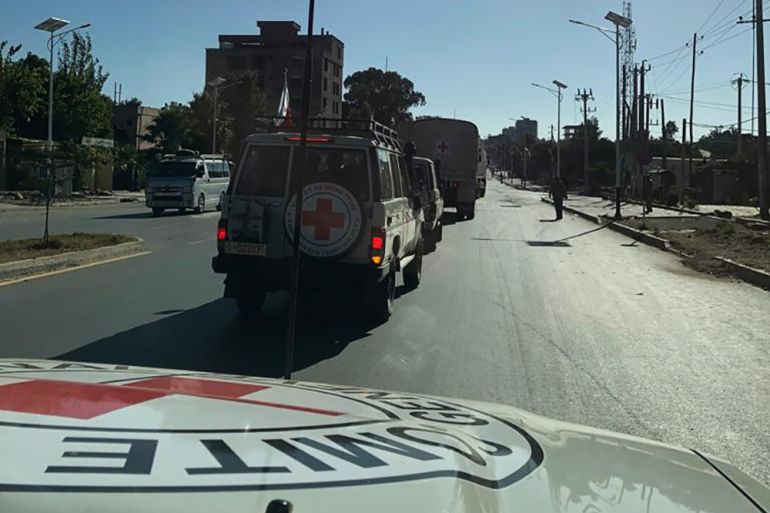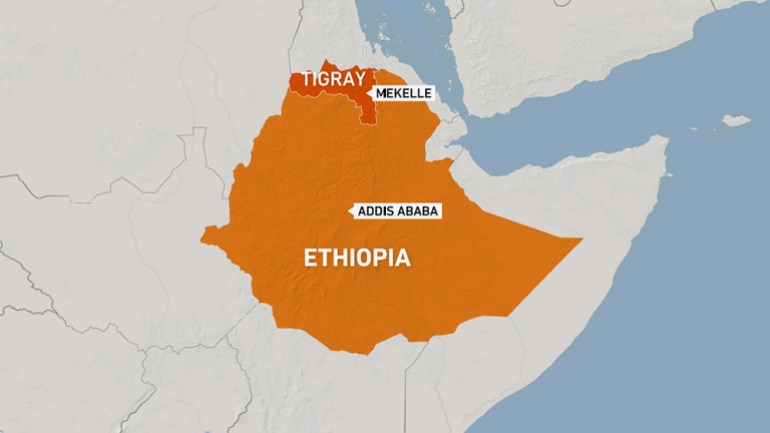Mekelle’s plight: A doctor’s account of Ethiopia’s Tigray war
Doctor at regional capital’s main hospital offers dramatic account of dire medical shortages, threat of starvation and widespread fear during the conflict.

Addis Ababa, Ethiopia – It has been more than two weeks since the Ethiopian military took control of Mekelle, the capital of the country’s northern Tigray region, from the now-overthrown regional government.
The fighting that began early last month between government troops and forces loyal to the Tigray People’s Liberation Front (TPLF) is thought to have killed thousands of people and forced an estimated one million from their homes.
Keep reading
list of 4 itemsWhat’s next as ‘heavy-handed’ US negotiates pullout from Niger?
A sanctioned strongman and the ‘fall’ of Myanmar’s Myawaddy
Russia-Ukraine war: List of key events, day 797
Despite the seizure of Mekelle on November 28, clashes between the federal forces and the TPLF are believed to be continuing in some parts of rural Tigray. Swathes of the mountainous state of more than five million people remain inaccessible to news outlets and humanitarian groups, while an internet and telephone blackout has made it difficult to obtain and verify information about the conflict.
But a testimony given to Al Jazeera by a doctor who worked at Mekelle’s main hospital until their return last week to Ethiopia’s capital, Addis Ababa, has offered a rare, first-hand account of the mounting medical needs and the dismal living conditions in the city during the conflict.
The doctor, whose name has been withheld to shield them from any possible reprisal, provided a copy of their identity card and another document to prove their yearlong employment at Ayder Referral Hospital. Their account below has been slightly edited for brevity and clarity.
“On the night of November 3, I was in the hospital’s operating room. Suddenly, the lights went out. The emergency room was then flooded with severely wounded soldiers. They were at least 60 from both sides. I am a gynaecologist but I had to help. In that moment alone, I witnessed five deaths.
“The next morning, the banks were closed. There was no electricity, no mobile phone network and no water. Everything happened out of the blue and nobody was prepared for it, in terms of food conservation and cash money. Luckily, I had some food in my home and a little cash, but I had to save it in every possible way.
“In the first two weeks of the war, there weren’t any issues with food supplies. But with banks closed, how could you buy anything? Some people with lots of cash in their hands managed to buy large quantities of grain. And later, when the banks reopened temporarily, the shortages began. Food prices inflated alarmingly. Tomatoes were being sold 100 birr [$2.6] per kilo, up from 20 birr; potatoes were 40 birr per kilo, from 10 birr. The supplies of basic food items started to run out. Bread, injera, teff and wheat grains vanished.
“I was faced with the threat of hunger. Some of my friends were already starting to starve. Fortunately, the people of Mekelle were all kind, despite the fact that I and my friends were Amharic-speaking. It was our Tigrayan neighbours and friends who were feeding us in those difficult times. For instance, one of my friends was eating in his landlord’s house for almost one month. She did not ask him to pay rent. Shops were lending us items. They were all very kind.
“As the fighting intensified, all the medical treatments that were not related to the conflict were suspended out of priority for war casualties. Beds filled and all the staff had to shift their focus. There were an average of 27 new casualties coming from all war fronts in Tigray on a daily basis until November 28.
“Two weeks after the start of the war, our superiors at the hospital began to warn us that we were running out of medical supplies. I had to sterilise gloves. There were no ambulances, telephone communication and electricity. Pregnant women started to give birth at home. Things were getting worse by the day. For a few days, the hospital was powered by a generator but the diesel then ran out. Patients started to die because operations could not take place and due to a lack of supplies.
“On November 5, I saw the first fighter jet over Mekelle. As someone who had never seen air strikes, I was very traumatised by the high-pitched noise. I witnessed five air strikes from that day on. The good thing was the jets were very cautious not to hit civilian spots. Before November 28, there was only one civilian death and few minor injuries from blasts. But as the National Army closed on Mekelle, more and more civilians, particularly from the nearby towns of Adigrat, Wukro and Edaghamus, started to flow.
“In Mekelle, the most civilian casualties were on November 28, the day the National Army entered the city. I witnessed 16 civilian deaths. Comparing it to other towns, people were relieved about the figure. On that day, there were artilleries on the outskirts of the city, their sound so heavy that it shook windows.
“I was very terrified. Out of 60 or 70 households in my condominium building, there were people in just five of them. Most fled out of fear but I had nowhere to go to, so I stayed. The building is close to the office of the president, Debretsion Gebremicheal [the leader of the TPLF]. The offices of Tigray TV, as well as the base of the Tigray police, was also near there. So, there was a lot of fear that there would be heavy fighting in the area.
“It was not as much as we feared. There was a shooting in the president’s office at night on November 28. The firing continued till the next morning. It receded at 10am. From that time on, there were no shootings or air strikes.
“But there was still widespread fear, uncertainty and confusion among many. I did not know what to do. I asked a soldier who was standing guard near my building if I could go to the hospital. Grinning, he told me I could. On November 29, the city was like a graveyard; very quiet, all shops closed and empty. When I arrived in the hospital, there was only a few staff.

“The news of the Mai Kadra massacre on November 9 had terrified many. At first, the perception of the residents was that the soldiers of Prime Minister Abiy Ahmed are brutal killers and looters. For days after the army took control of Mekelle, there was almost no activity, no taxis and no market. Many feared the soldiers would kill them on the spot just by looking at their ID. But the soldiers were peaceful. I have not seen the army committing any harassment, abuse, looting and rape. Slowly, the misconceptions began to change.
“Once, a patient followed me to the hospital’s entrance. She wanted to get in. But she was very scared of the soldiers who were there.
“‘Would the soldiers let me in?’ she asked me. I told her they were just standing guard.
“‘They would let me in even if I am Tigrayan?’ she asked with fear. As she could not believe me, I led her in.
“It was due to similar fears and the sense of uncertainty that the staff at the hospital, as well as its management, were skipping work.
“The hospital was almost closed. Providing medical treatment is a team effort, you cannot do it alone. On December 3, when the soldiers left the hospital area to go to another place, some groups of people attempted to get in and loot medical equipment. But the young men living around the hospital kicked the looters out immediately.
“There was looting in two places, including at the big market mall of Kedamay Woyane. After these incidents, you could hardly see a shop or a business offering services. It looked like a stateless city. You didn’t even know whom to ask for protection. The Tigray police had left, while the members of the army and the federal police were not yet familiar with the place.
“But apart from the lootings, I did not see any other criminal acts, protests, violence or human rights violations. The people were just eager to return to their normal life. I did not experience ethnic hatred from any side. And throughout my one-year in Mekelle, the members of the Tigray police were all good to me and to other non-Tigrayans.
“From what I heard, there is no guerilla warfare around Mekelle but there is fighting in the town of Abi Adi, 42km [26 miles] from Mekelle. A soldier who came injured from the fighting there told me that the TPLF leaders are all hiding in some underground spot there. He said the national army is trying to bring them out.
“I left Mekelle on December 7, and had I stayed for one more week, I would have definitely starved. Things were bad, there was not even charcoal to cook food and people had to use wood. Moreover, I had not been paid my salary. It is the federal government that pays salaries to resident doctors but we could not access the money because of the banks’ closure. We were not also paid any overtime fees. The hospital told us there was no money. After many days of begging, the hospital paid us that we got paid 1,200 birr.
“With money running out and prices rising by the day, I began to feel frustrated. So, together with my friends, we began to look for a way out. Finally, we found a car to Alamata, and from there to Addis Ababa.
“In the road, there were at least 12 checking points. The soldiers of the National Army would check our IDs and ask us many questions. They wanted to know if we carried a lot of money and weapons. But we did not encounter any violence.
“Along the way, I saw nine burned tanks, ruined houses and damaged power grids. I also saw at least 15 makeshift graves in the town of Mehoni.
“My parents were expecting to see me in a coffin. They could not believe I was alive. What I have observed after my return to Addis Ababa on December 9 is that there is exaggerated information, and the propaganda from both warring parties has played a role in this. Big lies have been said from both sides.”